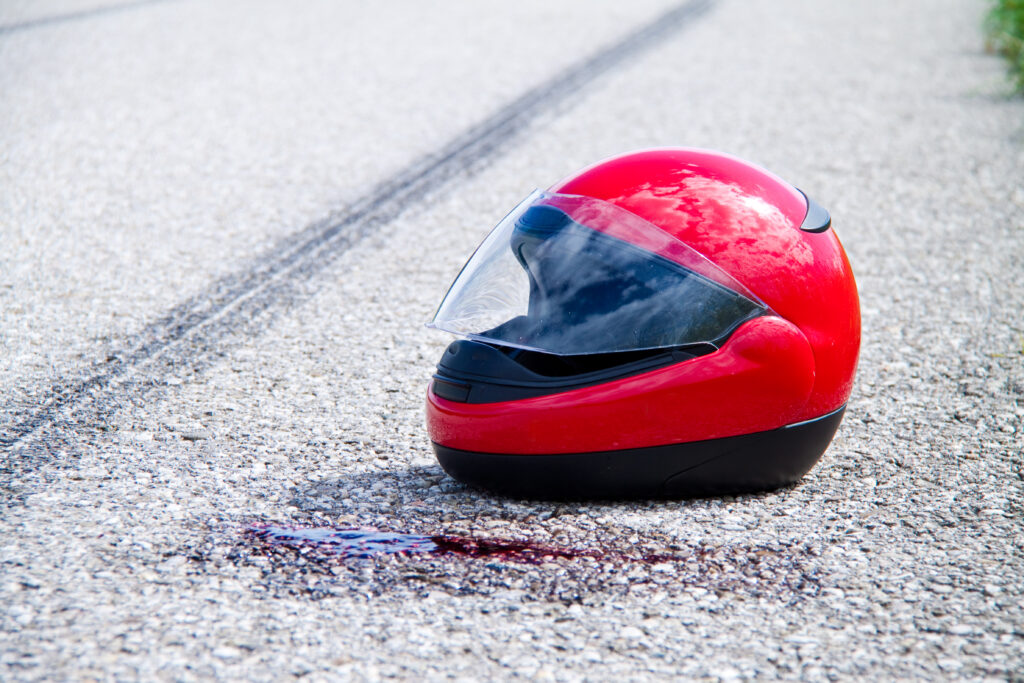
Georgia is a state that requires riders to wear a helmet—and for good reason. Many studies over the years have shown that wearing a helmet significantly reduces the risk of death or serious brain injury. Fewer injuries mean fewer medical resources being used, which saves the state money. If you ride motorcycles, focus on motorcycle helmet safety to keep yourself and any passengers safe in case of an accident.
Our firm has helped many crash victims bring compensation claims following an accident. In this article, we look at what the evidence shows regarding motorcycle helmet safety. Call our firm to talk about your accident with an
Helmets Reduce Deaths by Almost 40%
According to the National Highway Traffic Safety Administration (NHTSA), motorcycle helmets saved 1,870 motorcyclist’s lives in 2017. Had everyone worn a helmet, then an additional 750 people would have survived these collisions. NHTSA has found that helmets reduce fatalities by around 37%.
The number of fatalities continues to increase, partly because the number of people riding a motorcycle has jumped. In 1997, for example, only 2,116 motorcyclists lost their lives in a crash. By 2019, that number had risen to 5,014. Strapping on an approved helmet is not only required by the law, but it’s the simplest method for reducing the risk of a fatal accident on the road. All riders should practice motorcycle helmet safety to keep themselves and their passengers safe.
Helmets Lower the Risk of a Brain Injury by 67%
Brain injuries are some of the most serious motorcycle accident injuries, including:
- Traumatic brain injuries (TBIs): Riders can suffer from memory loss, headaches, impaired coordination, mood swings, and sleep disruption. Other symptoms include blurred vision or slurred speech and difficulty walking or talking. A mild TBI can take several months to heal, whereas more serious TBIs often leave someone permanently disabled.
- Intracranial hemorrhage: An accident victim can suffer bleeding inside their skull, which could possibly be fatal if not stopped in time.
- Brain contusion. The brain can strike the inside of the skull and suffer a bruise. Depending on the location of the contusion, a biker could suffer various impairments.
- Skull fracture. Any fracture can result in leaking of cerebrospinal fluid. There is also a risk of an infection.
Brain injuries often leave victims with permanent impairments. The Centers for Disease Control report that more than half of those suffering a moderate TBI were unemployed five years after their accident.
Studies show you can reduce the risk of a brain injury by strapping on a helmet. NHTSA reports that helmets reduce brain injuries by 67%. Someone who isn’t wearing a helmet is three times as likely to suffer a brain injury and complications.
Helmets Do Not Meaningfully Reduce Visibility
Some motorcyclists refuse to wear a helmet because they don’t like how it restricts their peripheral vision. However, as studies have shown, any restriction is minor (around 3%). A motorcyclist can easily compensate by turning their head a fraction more. That way, you can see any vehicle approaching when making a turn or going through an intersection.
Choose the Right Helmet
NHTSA recommends that those shopping for a helmet pick one that has been approved by the Department of Transportation (DOT). There should be a DOT symbol on the back. These helmets should have stiff foam inner liners and should weigh at least three pounds. Avoid novelty helmets which, although stylish, do not satisfy federal safety guidelines.
You should also pay close attention to:
- The shape of your head. Helmets typically come in round oval, intermediate oval, and long oval shapes.
- The size of your head. You should measure just above your eyebrows and go around to the thickest point at the back of your head. You don’t want a loose helmet, which will not absorb as much energy in the event of a crash.
- Helmet color. Many motorcyclists opt for a very bright helmet so they can stand out on the road. That makes sense. Many motorists report they don’t see motorcyclists the way they do cars.
Try on a helmet before buying it to ensure you have a comfortable fit.
We Help Accident Victims
What happens if you weren’t wearing a helmet when involved in a crash? For one thing, you are not necessarily prohibited from seeking compensation. Georgia recognizes comparative fault. Failure to wear a helmet is a type of negligence that can reduce the compensation you receive. However, you might still be able to sue the at-fault motorist who struck you or ran you off the road. They certainly shouldn’t get away scot-free simply because you were not wearing a helmet.
Call our firm today at 1-866-529-2453 to talk with one of our motorcycle accident lawyers about your crash. Schedule an initial consultation.
